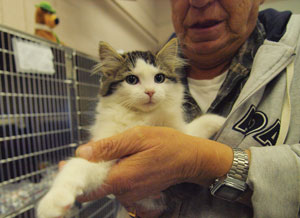
On Monday, November 28, members of Town Council and Administration were presented with a draft of the Responsible Pet Owners bylaw.
The draft was created in a joint effort between members of Town Administration and the Drumheller Humane Society and would replace the existing Animal Control Bylaw passed in 2000.
The bylaw aims to promote responsible pet ownership, especially among cat owners by requiring cat owners to register their cats.
The main objective of the bylaw is to reduce the feral cat population in Drumheller.
“It’ll control the feral cats running around town,” said Bob Benner, manager of the Humane Society. “We want to make sure people who own cats are responsible.”
“Saying that all cats have to be registered doesn’t really solve the problem,” said Councillor Lisa Hansen-Zacharuk. As responsible pet owners, we know that it’s not our cats ending up at the Humane Society.”
Issues involving cats account for roughly 70 per cent of the animal control costs incurred by the Town.
Feral cats, aside from their cost to the Town, have other problems as well. “When bylaw brings them to us, they’re usually sick because they’re so interbred,” explained Benner.
Dog owners already have to register their dogs and pay an annual registration fee of $35.00, more if the animal is not neutered or spayed.
The current incarnation of the bylaw would make cat and dog owners equal. Cat owners would be required to also pay annual registration fees per cat.
The registration fees would go towards helping to fund the Humane Society.
There has been some debate already regarding whether a registration fee is justified and, if so, if it should be annual or a one time payment.
“This organization is going to provide a much needed service,” said Councillor Jay Garbutt. “It only makes sense that people should pay who have a direct connection to the issue at hand.”
Councillor Hansen-Zacharuck disagrees, saying, “It’s basically a way to fund the Humane Society and I believe there are other ways to do that without having to add what amounts to a tax.”
“You are punishing the people who are responsible pet owners,” continued Councillor Hansen-Zacharuk.
“A one time fee is more feasible for cats,” commented Councillor Doug Stanford. “The people who are responsible should not have to pay a fee every year.”
Other concerns regarding registration were that being able to enforce registration would be nearly impossible for cats who stay indoors and that many cat owners would not be inclined to register if there were an annual fee.
A benefit for cat registration is that it would allow Animal Control to find the owners of lost cats quickly. It would be a simple matter of looking at the information on the tag.
Another contentious issue was that cats would be required to wear tags. As with registration, dogs already must wear tags.
Opposition to having cats wear tags centered around the difficulty in keeping a collar on a cat and the added cost for replacing tags.
“I can see putting a tag on a collar on a dog, but for cats?” commented Councillor Hansen-Zacharuk. “I replace cat collars two to three times a year because of break away collars.”
Other options would be to either tattoo or microchip cats instead.
Debate about the draft also focused on having outdoor cats.
In the Animal Control Bylaw currently in effect, it is stated in section 7.1 that it is not permitted to allow any cat to run at large.
“Any individual has the right to not have animals on their property that do not belong to them,” stated Councillor Garbutt.
Cats can cause property damage and defecate on another persons' property, which is not permitted in the current bylaw.
Outdoor cats also have a large negative environmental impact. Numerous studies point to domestic cats as a contributing factor to declining songbird populations.
There is concern over the safety of animals left to their own devices outside.
“We have a couple who had a cat that they used to let out and now they don’t know if it’s lost or coyote bait,” said Benner. "Owners are responsible for their cats.”
The new bylaw would also add laws regarding pets left in vehicles. Any pet left in the box of a truck must be restrained enough that it cannot reach passersbys. If a pet is left within a vehicle, adequate ventilation must be provided.
“We’re trying to suggest that part of being a responsible owner is to make sure that your animals are being cared for or restrained when they are out in the public,” said Paul Salvatore, Community Services Director.
Vicious dogs would be subject to far greater fines. For example, whereas currently the fine for a dog biting a person or another animal is $250, the fine would increase to at least $2000 in the new bylaw.
Another change the bylaw would bring is an increase to the number of animals that could be in a household. A maximum of three dogs and four cats would be permitted.
Pet owners who currently exceed those numbers would not be required to rid themselves of any, but neither would they be permitted to replace any pets.
Until the fate of the proposed bylaw is finalized, the Humane Society continues to promote responsible pet ownership.
“Pet owners need to have their pets spayed or neutered, don’t let them be outside, unless they are on a leash,” said Benner. That’s the best way I know to be responsible.”